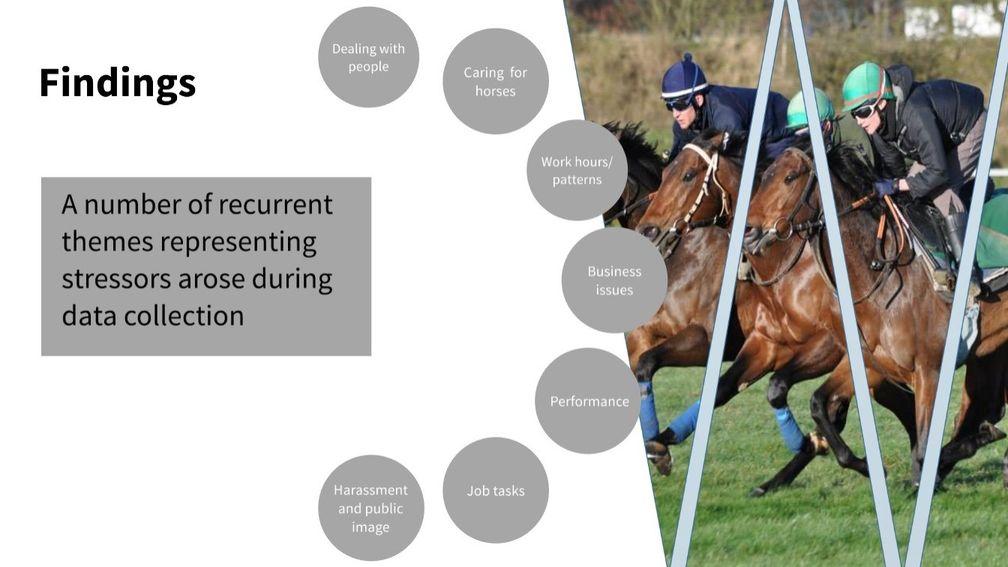Racing Welfare report highlights threat of stress to trainers' mental health
Racing Welfare and NTF seek to launch confidential help service

A break in the racing calendar is the main recommendation from trainers who contributed anonymously to a new report into the strain the profession puts on on its practitioners' mental health.
Racing Welfare's Simone Sear presented the findings of a wide-ranging study into the occupational stress suffered by trainers to the Horse Racing Industry Conference on Tuesday.
Among the recommendations are a dedicated help service for trainers, making available extra education and training, as well as investigating the sustainability of training as a business.
Sear has concluded training is an inherently stressful occupation and highlighted a host of factors that can have a negative impact on mental as well as physical health, including financial and business concerns, long and difficult working hours, and worry over the health and performance of horses.

The report, which is the culmination of Sear's MBA work at the University of Liverpool and which was sponsored by Racing Welfare, also showed every trainer contacted had reported they had received unsolicited abuse through voicemail, email or social media.
The most common themes among the trainers who participated in the study revolved around what Sears described as "time famine", with a relentless racing calendar and having someone who understands the role available to talk to, the most frequent suggestions made by those contacted.
Potential mental health problems identified by Sears runs to quite a list: sleep deprivation; insomnia and isolation resulting in outcomes such as low self-esteem; depression; anxiety; low confidence; and recurrent headaches.
Racing Welfare and the National Trainers' Federation will now work to establish a support network for trainers beyond the services available to people across the industry.
NTF president Rupert Arnold said: "Most trainers will recognise the depiction of their working lives drawn so vividly in Simone Sear's report of her MBA research. So many aspects of the racing operation revolve around the trainer’s role in the industry and this means trainers take on a wide range of responsibilities.
"The report shows the need to define the right support mechanisms to help trainers cope when the pressures are at their height. The NTF looks forward to working with Racing Welfare to develop that support."

Sear said she believed such a support service could draw on lessons learned from other high-stress professions.
She said: "The research has established the link that trainers have with multiple other highly stressful occupations and so highlights the potential seriousness of the issues they face.
"The research provides the industry with initial information which should inform future change, and ultimately will start a conversation about how best to support those whose roles underpin the sport."
The conference also heard from Liverpool John Moores University's Will McConn, whose research on issues affecting mental health across the racing industry is nearing conclusion.
McConn has interviewed 131 individuals across a broad geographical and seniority spectrum in the industry and has sought to identify different pressures brought to bear on jockeys, stable staff and trainers.
While the final report – also funded by Racing Welfare – is due to be published on May 13 to coincide with Mental Health Awareness week, McConn's initial findings point to three very different sets of stresses faced by those professions within racing.
Of particular note will be the work done around the "conditions of work" for those three disciplines.
Members can read the latest exclusive interviews, news analysis and comment available from 6pm daily on racingpost.com
Published on 6 February 2019inNews
Last updated 17:40, 6 February 2019
- The latest edition of the Racing Post is available to read online now - here's how you can access it
- How Smart View recorded a 76 per cent profit at the Cheltenham Festival
- Smart View is available on the Racing Post app - how to read the revolutionary new racecard
- Levy reform talks 'accelerating' as clock ticks down to April deadline for agreement
- Kieran Shoemark lands another plum Meydan ride for Gosden stable on Trawlerman in Saturday's Dubai Gold Cup
- The latest edition of the Racing Post is available to read online now - here's how you can access it
- How Smart View recorded a 76 per cent profit at the Cheltenham Festival
- Smart View is available on the Racing Post app - how to read the revolutionary new racecard
- Levy reform talks 'accelerating' as clock ticks down to April deadline for agreement
- Kieran Shoemark lands another plum Meydan ride for Gosden stable on Trawlerman in Saturday's Dubai Gold Cup